ASRock X79 Extreme9 Review - Price For Performance?
by Ian Cutress on January 24, 2012 2:00 AM EST- Posted in
- Motherboards
- ASRock
- X79
USB Speed
For this benchmark, we run CrystalDiskMark to determine the ideal sequential read and write speeds for the USB port using our 64GB Patriot SuperSpeed USB 3.0 drive. Then we transfer a set size of files from the SSD to the USB drive, and monitor the time taken to transfer. The files transferred are a 1.52 GB set of 2867 files across 320 folders – 95% of these files are small typical website files, and the rest (90% of the size) are the videos used in the Sorenson Squeeze test.
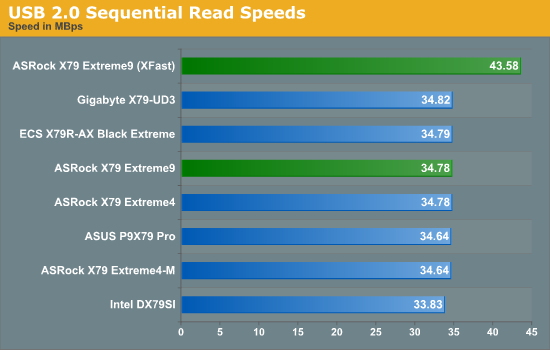
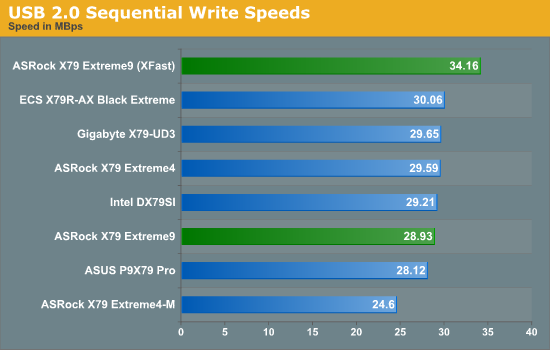
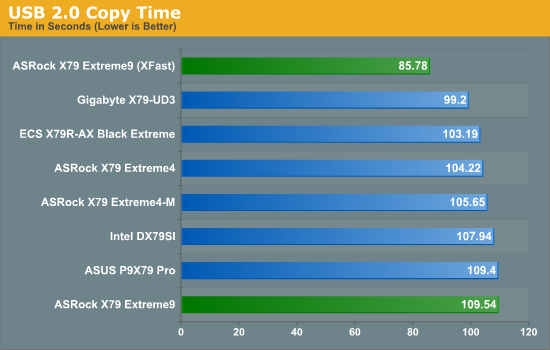
While the standard USB 2.0 performance is nothing to shout home about, the XFast performance shows that having XFast is better than not having XFast!
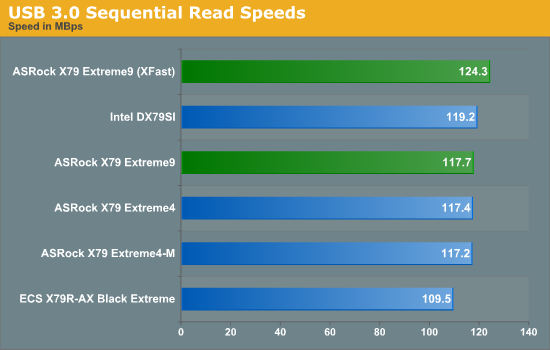
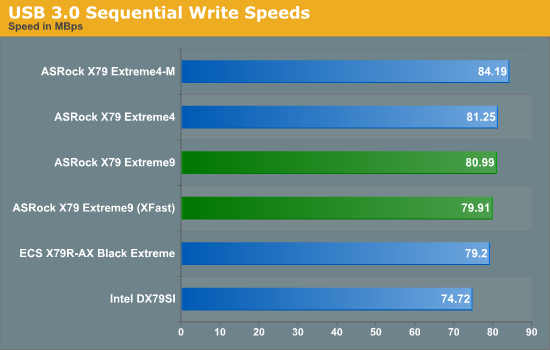
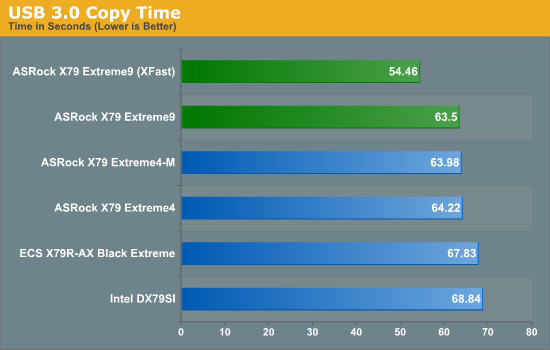
Similarly for USB 3.0 - XFast shows performance increases over the standard, particularly in real-world performance.
SATA Testing
We also use CrystalDiskMark for SATA port testing. The operating system is installed on the SSD, and the sequential test is run at the 5 x 1000 MB level. This test probes the efficiency of the data delivery system between the chipset and the drive, or in the case of additional SATA ports provided by a third party controller, the efficiency between the controller, the chipset and the drive.
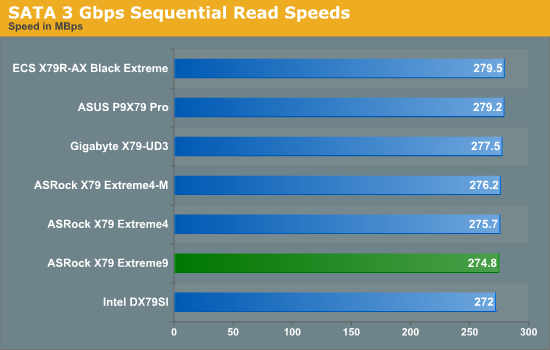
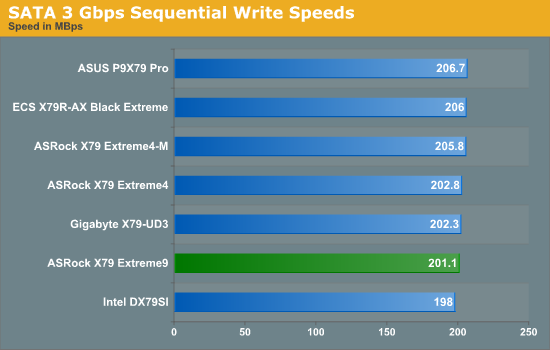
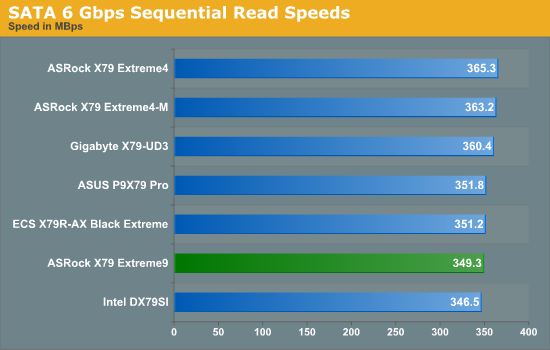
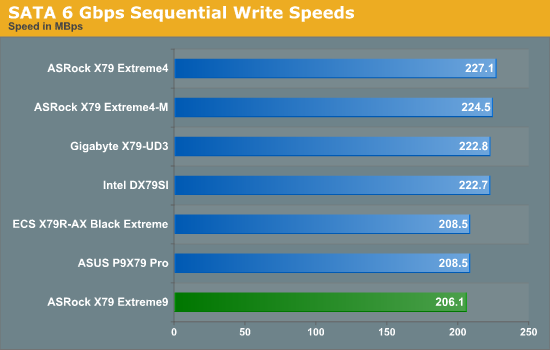
SATA speeds were not entirely impressive on the X79 Extreme9.
DPC Latency
Deferred Procedure Call latency is a way in which Windows handles interrupt servicing. In order to wait for a processor to acknowledge the request, the system will queue all interrupt requests by priority. Critical interrupts will be handled as soon as possible, whereas lesser priority requests, such as audio, will be further down the line. So if the audio device requires data, it will have to wait until the request is processed before the buffer is filled. If the device drivers of higher priority components in a system are poorly implemented, this can cause delays in request scheduling and process time, resulting in an empty audio buffer – this leads to characteristic audible pauses, pops and clicks. Having a bigger buffer and correctly implemented system drivers obviously helps in this regard. The DPC latency checker measures how much time is processing DPCs from driver invocation – the lower the value will result in better audio transfer at smaller buffer sizes. Results are measured in microseconds and taken as the peak latency while cycling through a series of short HD videos - under 500 microseconds usually gets the green light, but the lower the better.
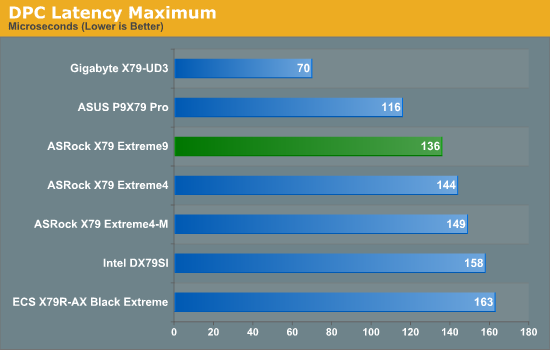
Our DPC test still has relevance, despite the audio now being dispatched to a separate processor on a PCIe card - we're still dealing with latency of interrupt requests rather than bandwidth and processing. The X79 Extreme9 performs well in this regard.










14 Comments
View All Comments
Hauk - Tuesday, January 24, 2012 - link
I remember jumping to X58 when I saw that a reasonably priced cpu (i7 920) which would OC like crazy came available. Not so much with X79, still waiting for i7 3820, all parts on hand, including an ASRock Extreme 7 ($259). It's not such a bad platform when cheap mobo's, cpus, and DDR3 are available. What about it Intel?? Stupid move IMO not getting 3820 to market sooner. X79 could have garnered more steam than it has..landerf - Tuesday, January 24, 2012 - link
For the record Creative's Core3D doesn't offload openal, in case anyone was expecting it too.BPB - Tuesday, January 24, 2012 - link
Does this board support SRT? If so I would actually consider spending the money on it.Blibbax - Tuesday, January 24, 2012 - link
"The X79 Extreme9 comes in around +50% more than those boards ($360 vs. ~$240), meaning I would expect 50% more when it came to the Extreme9."It never works like this. Is a Ferrari 5000% better than a Ford? What about 3960x vs. 3930k?
If you want maximum performance per price, there's no way you'd be looking at SB-E anyway.
purefun1965 - Wednesday, January 25, 2012 - link
I feel its overpriced. I would like it more if it was $300.00Stas - Wednesday, January 25, 2012 - link
ClrCMOS button is nice. That's about it.Stas - Wednesday, January 25, 2012 - link
Also, no 24-phase power? O.oAlexIsAlex - Wednesday, January 25, 2012 - link
I mentioned this in the last motherboard review, but as I didn't get an answer either way, I'll ask again just in case:What would be nice, in motherboard reviews, would be a measure of the cold boot (POST) time. This is something that different bioses can be differentiated on, and UFEI offers the potential for very fast boots if manufacturers take advantage of it properly.
Would it be possible to report, for comparison, the time between the power button being pressed and the installed bootloader starting? I was thinking it might be easiest to measure this by having no OS on the boot media and measuring the time to the "please insert boot media" message, but I'm sure you can think of other ways of doing it.
Another commenter also requested that this be done for both stock and overclocked settings, as he found boot times to be much slower with overclocked settings on his motherboard.
bji - Wednesday, January 25, 2012 - link
I would absolutely love to see these figures also. It is a major annoyance to me that my ASUS motherboard takes a full 7 - 8 seconds to even show the POST screen, and a further 1 - 2 seconds after that to get to my bootloader. I would personally highly value a greatly reduced POST time and would like to have this information in motherboard reviews. Having these values measured, evaluated, and compared is the only way that motherboard and BIOS makers will have any incentive to improve.javier_machuk - Sunday, January 29, 2012 - link
I'm on the same boat! my asus z68 board takes longer to post than to load windows with a intel 510 ssd!It would be interesting to compare this values between various manufacturers.